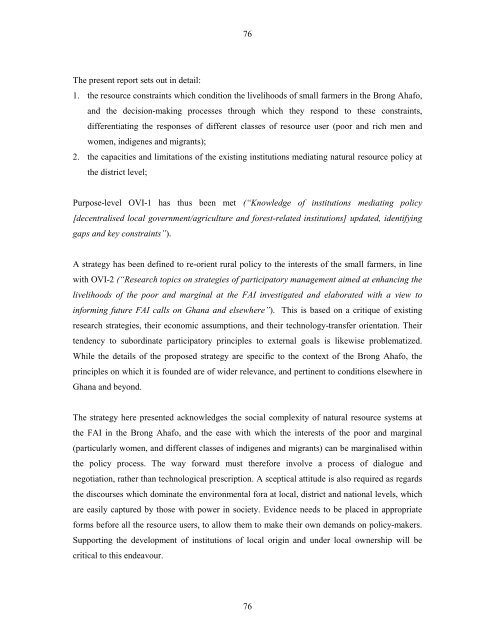Poverty Dimensions of Public Governance and Forest Management ...
Poverty Dimensions of Public Governance and Forest Management ...
Poverty Dimensions of Public Governance and Forest Management ...
You also want an ePaper? Increase the reach of your titles
YUMPU automatically turns print PDFs into web optimized ePapers that Google loves.
76<br />
The present report sets out in detail:<br />
1. the resource constraints which condition the livelihoods <strong>of</strong> small farmers in the Brong Ahafo,<br />
<strong>and</strong> the decision-making processes through which they respond to these constraints,<br />
differentiating the responses <strong>of</strong> different classes <strong>of</strong> resource user (poor <strong>and</strong> rich men <strong>and</strong><br />
women, indigenes <strong>and</strong> migrants);<br />
2. the capacities <strong>and</strong> limitations <strong>of</strong> the existing institutions mediating natural resource policy at<br />
the district level;<br />
Purpose-level OVI-1 has thus been met (“Knowledge <strong>of</strong> institutions mediating policy<br />
[decentralised local government/agriculture <strong>and</strong> forest-related institutions] updated, identifying<br />
gaps <strong>and</strong> key constraints”).<br />
A strategy has been defined to re-orient rural policy to the interests <strong>of</strong> the small farmers, in line<br />
with OVI-2 (“Research topics on strategies <strong>of</strong> participatory management aimed at enhancing the<br />
livelihoods <strong>of</strong> the poor <strong>and</strong> marginal at the FAI investigated <strong>and</strong> elaborated with a view to<br />
informing future FAI calls on Ghana <strong>and</strong> elsewhere”). This is based on a critique <strong>of</strong> existing<br />
research strategies, their economic assumptions, <strong>and</strong> their technology-transfer orientation. Their<br />
tendency to subordinate participatory principles to external goals is likewise problematized.<br />
While the details <strong>of</strong> the proposed strategy are specific to the context <strong>of</strong> the Brong Ahafo, the<br />
principles on which it is founded are <strong>of</strong> wider relevance, <strong>and</strong> pertinent to conditions elsewhere in<br />
Ghana <strong>and</strong> beyond.<br />
The strategy here presented acknowledges the social complexity <strong>of</strong> natural resource systems at<br />
the FAI in the Brong Ahafo, <strong>and</strong> the ease with which the interests <strong>of</strong> the poor <strong>and</strong> marginal<br />
(particularly women, <strong>and</strong> different classes <strong>of</strong> indigenes <strong>and</strong> migrants) can be marginalised within<br />
the policy process. The way forward must therefore involve a process <strong>of</strong> dialogue <strong>and</strong><br />
negotiation, rather than technological prescription. A sceptical attitude is also required as regards<br />
the discourses which dominate the environmental fora at local, district <strong>and</strong> national levels, which<br />
are easily captured by those with power in society. Evidence needs to be placed in appropriate<br />
forms before all the resource users, to allow them to make their own dem<strong>and</strong>s on policy-makers.<br />
Supporting the development <strong>of</strong> institutions <strong>of</strong> local origin <strong>and</strong> under local ownership will be<br />
critical to this endeavour.<br />
76
















